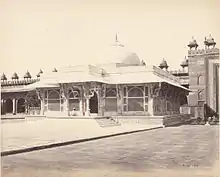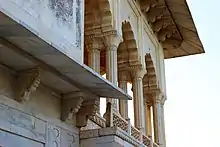
| Part of a series on Islam Sufism |
|---|
 |
|
|
Salim Chishti (1478–1572) (Urdu: [sə.ˈliːm ˈtʃɪʃtiː]) was a Sufi saint of the Chishti Order during the Mughal Empire in India.
Biography

Sheikh Salim Chishti was a descendant of Sheikh Farid, a Punjabi Sunni Muslim preacher and mystic.[1]
The Mughal Emperor Akbar came to Chishti's home in Sikri to ask him to pray for a male heir to the throne. Chishti blessed Akbar, and soon the first of three sons was born to him. After a year Mariam-uz-Zamani the queen had a son. Akbar named his first son 'Salim' (later emperor Jahangir). Akbar built Fatehpur Sikri in honour of Chishti.[2] A daughter of Sheikh Salim Chishti was the foster mother of Emperor Jahangir. The emperor was deeply attached to his foster mother, as reflected in the Jahangirnama[3] and he was extremely close to her son Qutb-ud-din Khan Koka who was made the governor of Bengal and Orissa.[4]
His eldest son, Saaduddin Khan, was ennobled Saaduddin Siddique and was granted three jagirs in the Gazipur District of Amenabad, Talebabad and Chandrapratap. Currently, his great grandson Kursheed Aleem Chishti lives there and is the 16th generation of Salim Chishti.[5] These descendants in Bangladesh include Chowdhury Kazemuddin Ahmed Siddiky, the co-founder of the Assam Bengal Muslim League and the University of Dhaka; Justice Badruddin Ahmed Siddiky;[6] Chowdhury Tanbir Ahmed Siddiky, the Commerce Minister of Bangladesh;and Chowdhury Irad Ahmed Siddiky, an anti-corruption activist and candidate for the Mayor of Dhaka in 2015. The descendant of his second-eldest son, Shaikh Ibrahim, was granted the title Kishwar Khan and now reside in Sheikhupur, Badaun in India.[7]
Salim Chishti Tomb



See also
- Islam Khan I (grandson)
- Islam Khan V
- Mukarram Khan, great-grandson
- Sheikhupur, Badaun
- Qutubuddin Koka
References
- ↑ "Ma'asir al-Umara of Shahnavaz Khan Aurangabadi, Vol. 2, English". MUGHAL LIBRARY. p. 87. Retrieved 19 February 2023.
Sheikh Salim Chishti, surnamed Sheikh-ul-Islam was a descendant of Shaikh Farid of Shakarganj
- ↑ Muhammad-Hadi (1999). Preface to The Jahangirnama. Translated by Thackston, Wheeler M. Oxford University Press. p. 4. ISBN 978-0-19-512718-8.
A dervish named Shaykh Salim [Chisti] ... lived in the town of Sikri ... If His Majesty [Akbar]'s wish were divulged to him, there was hope that it would be granted through his prayers. Consequently, His Majesty went to the shaykh's house ... Because there had been true intention and firmness of belief, in a short while the tree of hope bore fruit ... For the well-being of this offspring ... he was given the name Sultan Salim.
- ↑ Jahangir, Emperor of Hindustan (1999). The Jahangirnama: Memoirs of Jahangir, Emperor of India. Translated by Thackston, Wheeler M. Oxford University Press. p. 65. ISBN 978-0-19-512718-8.
Qutbuddin Khan Koka's mother passed away. She had given me milk in my mother's stead—indeed, she was kinder than a mother—and I had been raised from infancy in her care. I took one of the legs of her bier on my own shoulder and carried it a bit of the way. I was so grieved and depressed that I lost my appetite for several days and did not change my clothes.
- ↑ Rogers, Alexander; Beveridge, Henry, eds. (1909). The Tūzuk-i-Jahāngīrī or Memoirs of Jahāngīr, Volume 2. Royal Asiatic Society, London. p. 62.
- ↑ Khan, Muazzam Hussain (2012). "Qutbuddin Khan Kokah". In Islam, Sirajul; Jamal, Ahmed A. (eds.). Banglapedia: National Encyclopedia of Bangladesh (Second ed.). Asiatic Society of Bangladesh.
- ↑ Siddiky, Leila Rashida (2012). "Siddiky, Justice Badruddin Ahmad". In Islam, Sirajul; Jamal, Ahmed A. (eds.). Banglapedia: National Encyclopedia of Bangladesh (Second ed.). Asiatic Society of Bangladesh.
- ↑ Qutubuddin Koka
External links
 Media related to Salim Chishti Tomb at Wikimedia Commons
Media related to Salim Chishti Tomb at Wikimedia Commons